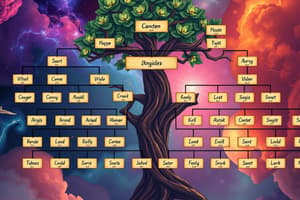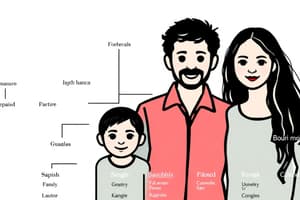Podcast
Questions and Answers
What is the primary difference between a family tree and a language tree?
What is the primary difference between a family tree and a language tree?
- A family tree represents genetics while a language tree represents upbringing.
- A family tree includes siblings while a language tree does not.
- A family tree shows ancestry while a language tree shows the development of languages. (correct)
- A family tree focuses on grandparents while a language tree focuses on parents.
In what way are new generations influenced by the previous one?
In what way are new generations influenced by the previous one?
- Only through genetics.
- Only through upbringing.
- Not influenced at all.
- Through genetics and upbringing. (correct)
How do different dialects of German-speaking regions relate to the Germanic language family?
How do different dialects of German-speaking regions relate to the Germanic language family?
- They are branches of the Germanic language family tree. (correct)
- They are separate from any language origins.
- They are completely independent languages.
- They are not part of any language family.
What is the function of the base language in a language tree?
What is the function of the base language in a language tree?
How does the passage describe the relationship between siblings and parents in terms of similarity?
How does the passage describe the relationship between siblings and parents in terms of similarity?
What does the passage suggest about the characteristics of each new generation?
What does the passage suggest about the characteristics of each new generation?
How is a language tree similar to a family tree?
How is a language tree similar to a family tree?
What do language trees help us understand, in addition to the evolution of languages?
What do language trees help us understand, in addition to the evolution of languages?
Why do people from the same town generally understand each other better?
Why do people from the same town generally understand each other better?
Which Germanic language group did Old English belong to?
Which Germanic language group did Old English belong to?
What is the relationship between English, Dutch, and German based on the text?
What is the relationship between English, Dutch, and German based on the text?
How did Old English eventually develop into modern English according to the text?
How did Old English eventually develop into modern English according to the text?
What does the text suggest about settlement patterns when a new language branch is created?
What does the text suggest about settlement patterns when a new language branch is created?
How does language evolution relate to the development of human cultures and societies?
How does language evolution relate to the development of human cultures and societies?
What is the main implication of the slow creation of a new branch on the language tree according to the text?
What is the main implication of the slow creation of a new branch on the language tree according to the text?




